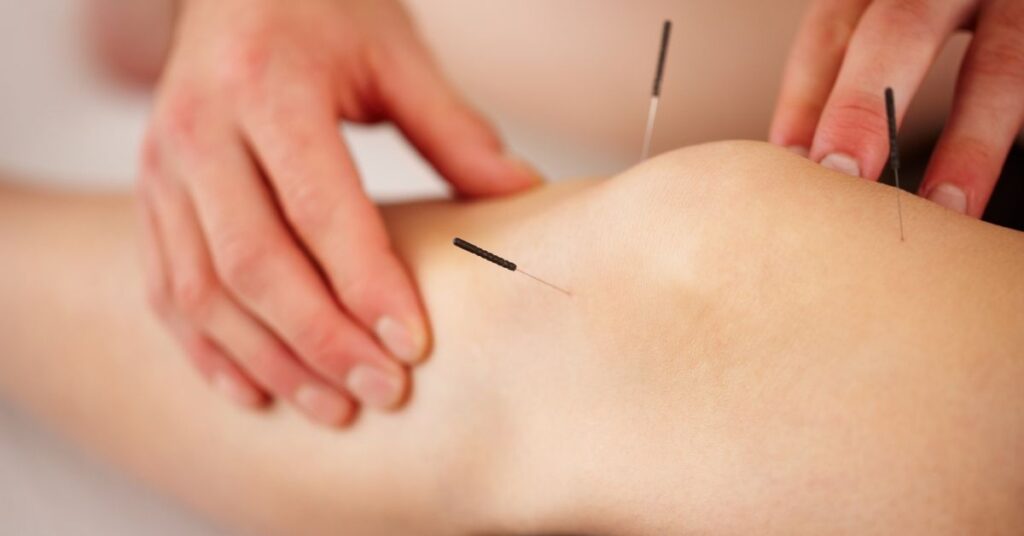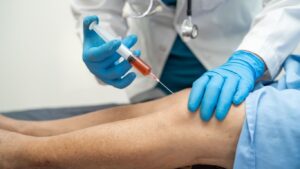Lymphedema is a chronic condition that results in the abnormal buildup of lymph fluid in the body’s tissues, often leading to swelling, discomfort, and sometimes even permanent damage to the affected area. While various medical treatments are available, acupuncture has emerged as an alternative therapy that some individuals with lymphedema find beneficial. This article will explore lymphedema, its symptoms, traditional treatment methods, and how acupuncture may play a role in its management.
What is Lymphedema?
Lymphedema occurs when the lymphatic system, which is responsible for transporting lymph—a fluid that helps remove waste from the body—becomes damaged or blocked. As a result, the lymph fluid accumulates in the tissues, causing swelling, typically in the arms or legs. This condition can develop either as a primary disorder, where the lymphatic system is faulty from birth, or as a secondary disorder, often due to surgery, radiation therapy, or injury that affects the lymphatic system.
Symptoms of Lymphedema
The most noticeable symptom of lymphedema is swelling, but this condition can also cause several other issues:
- Heaviness or tightness in the affected limb.
- Reduced range of motion, making it harder to move the swollen area.
- Pain or discomfort, which can be mild or severe.
- Hardening or thickening of the skin over time, a condition known as fibrosis.
- Recurrent infections due to impaired fluid drainage.
- Swelling that worsens throughout the day and may improve slightly overnight.
Traditional Treatment Options for Lymphedema
Lymphedema is typically managed rather than cured. Traditional treatments reduce swelling, improve lymphatic flow, and prevent complications. These methods include:
Compression Therapy
Compression garments, such as sleeves or stockings, are among the most common methods of controlling swelling. These garments apply gentle pressure to the affected area, helping to promote the flow of lymph fluid and prevent further buildup.
Manual Lymphatic Drainage (MLD)
MLD is a form of gentle massage designed to stimulate the flow of lymph and reduce fluid accumulation. A trained therapist typically performs it and involves slow, rhythmic movements that help guide the lymph fluid toward healthy lymph nodes.
Exercise and Movement
Certain exercises are specifically designed to help enhance the movement of lymph fluid in the body. Activities such as walking, swimming, or yoga can improve circulation and promote lymphatic drainage.
Skin Care
Proper skin care is crucial for individuals with lymphedema, as the swelling can lead to skin breakdown, making it more prone to infections. Regular moisturizing and taking precautions to avoid cuts and scrapes are essential parts of a care routine.
Acupuncture: An Overview
Acupuncture is a traditional Chinese medicine used for thousands of years to treat various health conditions. The practice involves inserting thin needles into specific points on the body, known as acupuncture points, to stimulate the body’s natural healing processes. While the scientific understanding of acupuncture is still evolving, many believe it works by balancing the energy flow, or “qi,” through the body’s meridian system.
Acupuncture is increasingly being used as an adjunctive therapy for a variety of conditions, including pain management, stress reduction, and improving circulation. Some studies have suggested that acupuncture can positively affect the lymphatic system, which has led to its use in treating lymphedema.
How Acupuncture May Help Treat Lymphedema
Though acupuncture is not a replacement for traditional lymphedema treatments, it may offer several benefits for individuals struggling with this condition. Here are some ways acupuncture could help:
Improving Lymphatic Flow
Acupuncture may stimulate the body’s ability to move lymph fluid more effectively. Some studies suggest that acupuncture can activate the nervous system, promote blood circulation, and encourage the flow of lymphatic fluid. This could help reduce swelling and alleviate discomfort associated with lymphedema.
Reducing Inflammation and Swelling
One of the key benefits of acupuncture is its ability to reduce inflammation, which is often a significant concern in lymphedema. By stimulating acupuncture points related to inflammation and swelling, acupuncture may help regulate the immune system and reduce the body’s inflammatory response, leading to decreased swelling in the affected area.
Pain Relief
Lymphedema can cause significant discomfort, ranging from mild aches to intense pain. Acupuncture has long been used as a natural pain management tool, and it is thought to help reduce pain by releasing endorphins, the body’s natural painkillers. This could help individuals with lymphedema experience relief from the aching or tightness often associated with the condition.
Enhancing Mental Well-Being
Living with a chronic condition like lymphedema can have a psychological impact, causing feelings of frustration, anxiety, or depression. Acupuncture has been shown to positively affect mental well-being by promoting relaxation, reducing stress, and improving overall mood. This could be especially helpful for people with lymphedema who are struggling with the emotional challenges of managing a long-term health condition.
Supporting the Body’s Natural Healing Process
In addition to promoting lymphatic flow and reducing pain, acupuncture supports the body’s natural healing process by enhancing circulation and boosting immune function. This could help speed up the recovery process after surgery or other treatments related to lymphedema.
Scientific Evidence Supporting Acupuncture for Lymphedema
While acupuncture is widely regarded as a complementary therapy, the scientific evidence supporting its effectiveness in treating lymphedema is still limited. However, several studies have suggested that acupuncture can provide relief from swelling and pain in individuals with this condition.
One study published in the Journal of Clinical Oncology found that acupuncture, when used alongside traditional treatments for lymphedema, significantly improved symptoms such as swelling and pain. Another study in Lymphatic Research and Biology indicated that acupuncture helped improve lymphatic function and reduced the severity of swelling in patients with breast cancer-related lymphedema.
Although more research is needed to understand the mechanisms behind acupuncture’s effects on lymphedema fully, these early findings are promising and suggest that acupuncture could be a helpful adjunctive therapy for those seeking alternative or complementary treatment options.
How to Incorporate Acupuncture into Your Lymphedema Treatment Plan
If you are considering acupuncture as part of your lymphedema treatment, it is important to speak with your healthcare provider first. While acupuncture is generally considered safe, it should always be used in conjunction with other medical treatments. A licensed acupuncturist with experience treating lymphedema is ideal, as they can tailor the treatment to your needs.
Acupuncture treatments typically last between 30 and 60 minutes and are often recommended once or twice a week, depending on the severity of your symptoms and your personal treatment plan. Most individuals experience mild sensations during acupuncture, such as a slight tingling or warmth at the insertion points. The effects of acupuncture are often gradual, and it may take several sessions before noticeable improvements are felt.
Additional Complementary Therapies for Lymphedema
While acupuncture can be an effective complementary treatment for lymphedema, it should not be relied on as the sole therapy. Treatments such as manual lymphatic drainage, compression therapy, and exercise should also be part of a comprehensive approach to managing the condition.
Conclusion
Lymphedema is a challenging condition that requires a multifaceted approach to treatment. Acupuncture may offer a promising adjunct to traditional therapies by improving lymphatic flow, reducing inflammation and pain, and promoting overall well-being. While scientific evidence is still emerging, acupuncture could be an effective tool for individuals seeking alternative or complementary treatments for lymphedema. As always, working closely with your healthcare provider to create a comprehensive treatment plan tailored to your specific needs is essential.
Frequently Asked Questions
Q1: Can acupuncture cure lymphedema?
- No, acupuncture cannot cure lymphedema. However, when used alongside traditional treatments, it may help reduce symptoms such as swelling and pain.
Q2: How often should I get acupuncture for lymphedema?
- The frequency of acupuncture treatments will depend on the severity of your condition and your healthcare provider’s recommendations. Typically, sessions are held once or twice a week.
Q3: Is acupuncture painful?
- Acupuncture is generally not painful. Most people feel little to no discomfort when the thin needles are inserted, though some may experience mild sensations like tingling or warmth.
Q4: Are there any risks associated with acupuncture for lymphedema?
- Acupuncture is considered safe when performed by a trained and licensed acupuncturist. However, it is essential to consult your healthcare provider before starting treatment.
Q5: Can acupuncture be used alongside other lymphedema treatments?
- Yes, acupuncture can be used in combination with traditional lymphedema treatments such as compression therapy, manual lymphatic drainage, and exercise for a more comprehensive approach to managing the condition.





